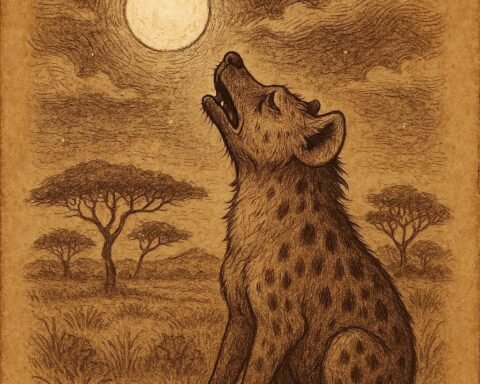Long ago, when the Bari people of South Sudan first settled along the great Nile, life was full of both blessings and challenges. The clans farmed the fertile soil, hunted in the tall grasses, and fished in the wide rivers. Yet there was one struggle they faced again and again. The people often became scattered, and when danger or celebration came, there was no way to gather everyone quickly. Families lived apart, and at times of joy or sorrow, the community longed for a voice powerful enough to call them all together.
One evening, as the elders sat by the fire, they wondered aloud how unity could be kept among so many people spread across the land. Their words rose into the night sky, and the spirits who walked between earth and heaven heard their plea. That very night, a mysterious sound echoed through the forest. It was deep, strong, and rhythmic, like the heartbeat of the earth itself. No one had ever heard such music before.
READ THIS:The Sky Cattle of Nhialic
The people followed the sound until they reached the clearing of an ancient fig tree. There, resting against its roots, lay the first drum. Its surface was stretched tight with hide, its body carved from sacred wood, and its power seemed to glow in the moonlight. The elders knew at once that this was no ordinary gift. The spirits themselves had given the Bari a voice that could reach every ear, whether human or ancestral.
When the drum was played, its rhythm carried far across the land. The people came running from their farms, their homes, and their riverside huts. With every beat, the earth seemed to answer, and even the ancestors stirred from their resting places. The Bari believed that when the drum sounded, both the living and the dead were listening, bound together by music that bridged the worlds.
The drum soon became the heart of Bari life. When a wedding was held, the drum called the people to dance. When danger threatened, its sound warned the community to gather for defense. When sorrow fell upon a family, the drum called the clan to comfort them. It became more than an instrument. It was a sacred reminder that no one lived alone, for music tied the living to their ancestors and to each other.
One tale tells of a time when a famine struck the land. Crops failed, cattle grew weak, and hunger spread. The elders, unsure of what to do, beat the sacred drum. Its sound carried into the spirit world, where the ancestors heard the cry of their children. That night, the people dreamed of fields heavy with grain and rivers full of fish. The next morning, rains returned, and soon the famine ended. The Bari believed the drum had carried their prayer to the spirits and brought their blessings back to earth.
From that time forward, the first drum was treated with great respect. It was never played carelessly, and only chosen hands could strike it. Children were taught that its voice belonged not only to the living but also to the ancestors who walked unseen among them.
The Bari still tell the story of the first drum to remind each new generation that music carries more than sound. It holds memory, spirit, and the power to bind people together. To this day, the rhythm of the drum remains the heartbeat of the community, echoing the gift once given by the spirits under the ancient fig tree.
Moral Lesson
The story of The First Drum of the Bari teaches that music is more than entertainment. It is a sacred gift that unites people, strengthens communities, and bridges the gap between the living and their ancestors. It shows that true harmony comes when individuals listen to the rhythms of unity and respect the voice of tradition.
Knowledge Check
What problem did the Bari people face before the first drum appeared?
They struggled to gather the community quickly during times of danger, joy, or sorrow.How did the Bari receive the first drum?
The spirits placed it under an ancient fig tree as a gift to the people.What happened when the first drum was played?
Its sound gathered both the living and the ancestors, uniting the human and spirit worlds.How did the Bari use the drum in times of famine?
They beat the drum to call upon the ancestors, and the rains returned to save the people.Why was the drum treated with such respect?
Because it was believed to carry the voices of both the living and the dead, making it sacred.What lesson does the first drum symbolize for the Bari?
That music is a divine gift which unites communities, connects to ancestors, and strengthens identity.
Source: Bari folktale, South Sudan. Referenced in Harold Scheub’s The African Storyteller (1999).



